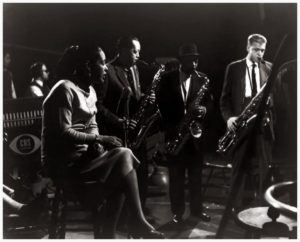My Wall Street Journal “Sightings” column for this week, which has just been posted online by the Journal in light of its timeliness, is a tribute to Nat Hentoff. Here’s an excerpt.
* * *
 When Nat Hentoff died on Saturday at the age of 91, one of his sons broke the news on Twitter. That might well have amused Hentoff, a technological Luddite who never abandoned the typewriter and never established a social-media beachhead. He might also have been amused—if grimly so—by the fact that many of his obituaries devoted more space to his latter-day career as a civil libertarian than to the writings about jazz with which he made his journalistic name. Sad to say, that makes perfect sense. Not only had the music that Hentoff loved best (he died listening to the records of Billie Holiday) ceased to be central to the American cultural conversation by the time of his death, but he was a First Amendment absolutist who lived to see free speech under siege in his native land, which explains why his impassioned writings about it should now loom so large in memory. Still, few who know his work at all well are in doubt that he will be remembered longest as one of the foremost jazz commentators of the 20th century.
When Nat Hentoff died on Saturday at the age of 91, one of his sons broke the news on Twitter. That might well have amused Hentoff, a technological Luddite who never abandoned the typewriter and never established a social-media beachhead. He might also have been amused—if grimly so—by the fact that many of his obituaries devoted more space to his latter-day career as a civil libertarian than to the writings about jazz with which he made his journalistic name. Sad to say, that makes perfect sense. Not only had the music that Hentoff loved best (he died listening to the records of Billie Holiday) ceased to be central to the American cultural conversation by the time of his death, but he was a First Amendment absolutist who lived to see free speech under siege in his native land, which explains why his impassioned writings about it should now loom so large in memory. Still, few who know his work at all well are in doubt that he will be remembered longest as one of the foremost jazz commentators of the 20th century.
To be sure, the word “commentator” doesn’t quite convey the nature and range of Hentoff’s jazz-related activities. Though he wrote his share of concert and record reviews in his youth, he wasn’t exactly a jazz critic, nor was he a scholar or a musician. Instead, he was something equally important—an intelligent enthusiast with good taste and a receptive ear. The National Endowment for the Arts summed him up well when, in 2004, it honored Hentoff with one of its Jazz Master awards, describing him as a “jazz advocate.” In that capacity he was nonpareil: No writer did more for jazz.
Hentoff himself believed that “if anything I’ve written about this music lasts, it will be the interviews I’ve done with the musicians for more than 50 years….My hope is that some of them become part of jazz histories.” That was just what happened. One of the last living links to the founding fathers of jazz, he knew and interviewed most of the great musicians whose paths he crossed through the years, and a considerable number of the familiar quotes and anecdotes that long ago passed into the common stock of jazz reference can be traced back to his pieces….
 He wrote about many other kinds of artists, among them Ray Charles, Bob Dylan and Bob Wills, for the Journal and virtually every other newspaper and magazine of consequence. But it was jazz that spoke most strongly to him, and it may well be that his signal achievement as an advocate was to help choose the roster of musicians who performed on “The Sound of Jazz,” the legendary 1957 TV special on which the illustrious likes of Holiday, Count Basie, Roy Eldridge, Coleman Hawkins, Thelonious Monk, Gerry Mulligan, Pee Wee Russell, Ben Webster and Lester Young were seen playing in a casual jam-session setting. “For me, it was a jazz fan’s fantasy come true,” Hentoff recalled 50 years after the show first aired on CBS. It was also a priceless gift to posterity: To this day “The Sound of Jazz” continues to be widely regarded as the finest jazz program ever telecast….
He wrote about many other kinds of artists, among them Ray Charles, Bob Dylan and Bob Wills, for the Journal and virtually every other newspaper and magazine of consequence. But it was jazz that spoke most strongly to him, and it may well be that his signal achievement as an advocate was to help choose the roster of musicians who performed on “The Sound of Jazz,” the legendary 1957 TV special on which the illustrious likes of Holiday, Count Basie, Roy Eldridge, Coleman Hawkins, Thelonious Monk, Gerry Mulligan, Pee Wee Russell, Ben Webster and Lester Young were seen playing in a casual jam-session setting. “For me, it was a jazz fan’s fantasy come true,” Hentoff recalled 50 years after the show first aired on CBS. It was also a priceless gift to posterity: To this day “The Sound of Jazz” continues to be widely regarded as the finest jazz program ever telecast….
* * *
Read the whole thing here.
A complete kinescope of “The Sound of Jazz,” originally telecast live by CBS on December 8, 1957:
